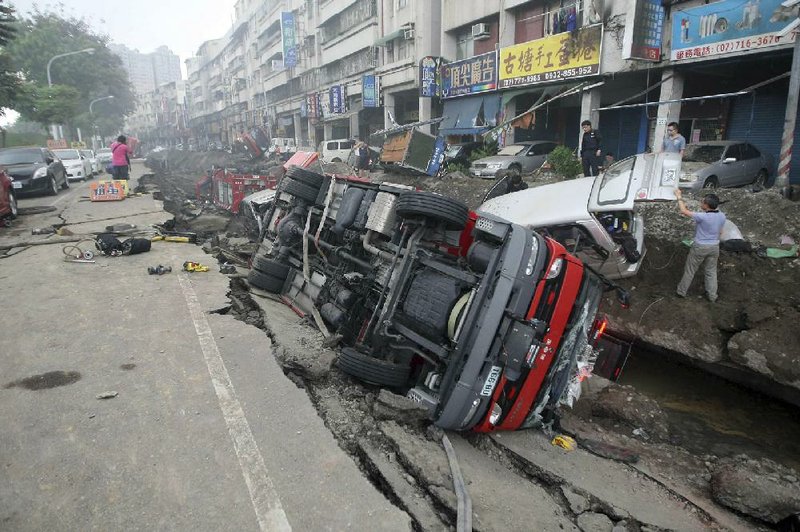Gas explosions in Taiwan kill at least 24
KAOHSIUNG, Taiwan -- At least 24 people were killed and 271 others injured when several underground gas explosions ripped through Taiwan's second-largest city overnight, hurling concrete through the air and blasting long trenches in the streets, authorities said today.
The series of explosions about midnight Thursday and early today struck a district where several petrochemical companies operate pipelines alongside the sewer system in Kaohsiung, a southwestern port with 2.8 million people.
The fires were believed to be caused by a leak of the petrochemical propene, but the source of the gas was not immediately clear, officials said.
Four firefighters were among the 24 dead, the National Fire Agency said. They had been at the scene investigating reports of a gas leak when the explosions occurred, Taiwan's Central News Agency reported.
At least five blasts shook the city, Taiwan's Premier Jiang Yi-huah said.
Chang Jia-juch, the director of the Central Disaster Emergency Operation Center, said the leaking gas was most likely to be propene and that the fires could not be extinguished by water.
He said emergency workers would have to wait for the gas to burn away, making it difficult for firefighters to search for others who might be buried in the rubble.
Hezbollah leader killed on 'jihadi mission'
BEIRUT -- A commander with the Lebanese militant group Hezbollah was recently killed while on a "jihadi mission" in Iraq, officials in Lebanon said Thursday. The officials, who are close to the Shiite group, said Ibrahim Mohammed al-Haj was killed sometime in the past week.
They did not provide any details on his mission or circumstances of his death and spoke on condition of anonymity because they were not authorized to talk to the media.
It was the first known Hezbollah death in Iraq since the Sunni extremist group known as the Islamic State captured large parts of the country north and west of Baghdad in June.
Iraqi officials have said a handful of advisers from Hezbollah are offering front-line guidance to Iraqi Shiite militias fighting the Sunni extremists north of Baghdad. But it is not known if any Hezbollah members are actually fighting along Iraqi Shiite militiamen.
In July 2006, al-Haj was among a group of Hezbollah fighters who crossed into Israel and captured two Israeli soldiers and took them into Lebanon, Lebanese security officials said. The capture triggered a 34-day war between Israel and Hezbollah that left 160 Israelis and 1,200 Lebanese dead.
Judge probes '06 death of ex-KGB officer
LONDON -- A senior judge in London on Thursday opened a high-profile public inquiry into the poisoning death of the former KGB officer Alexander Litvinenko, saying allegations of Moscow's involvement would be "of central importance."
Litvinenko, a critic of Russian President Vladimir Putin, died in November 2006 at age 43 after ingesting polonium-210, a rare radioactive isotope that investigators later found in high concentrations in a teapot at a central London hotel where he had met with Russian associates.
Despite the formal opening of the inquiry, it will not hear from witnesses until January, after a further procedural session in September. Even then, some of the hearings will be held in private because of national security considerations.
The British government has said it was a coincidence that the inquiry was allowed to proceed as tensions between Russia and the West rose over fighting in Ukraine. Until last week, British authorities, seeking improved trade and diplomatic ties with Moscow, had resisted attempts to open an inquiry into Litvinenko's death.
Man sues China clinic for shock therapy
BEIJING -- A gay Chinese man said Thursday that he was suing a psychological clinic for carrying out electric shocks intended to turn him straight. The lawsuit also targeted the search engine Baidu for advertising the center.
The Beijing LGBT Center, which campaigns for gay rights, said it was the first court case involving so-called conversion therapy in China. China declassified homosexuality as a mental disorder in 2001.
The center's executive director, Xin Ying, said some professional hospitals in China, as well as smaller private clinics, still provide conversion therapy and that the group hopes the case at the Haidian District People's Court in Beijing will lead to a ban on the therapy.
Yang Teng, 30, said the therapy given to him included hypnosis and electric shock and that he was left physically and mentally hurt. He said he voluntarily underwent the therapy in February after pressure from his parents.
His lawyer, Li Duilong, said Yang was suing the Chongqing Xinyu Piaoxiang clinic for infringing his personal and health rights because they told him electric shock treatment was not dangerous. He also said Baidu bore joint liability because it carried the clinic's advertisement.
U.N.: Religious rights violated in Vietnam
HANOI, Vietnam -- A United Nations official who went to Vietnam to assess religious freedom in the Southeast Asian country said Thursday that security agents closely monitored his visit and people he wanted to meet were harassed and intimidated.
Heiner Bielefeldt, the U.N. special rapporteur, said he concluded that serious violations of religious freedom existed, while noting some improvements. Planned visits to three provinces were interrupted, Bielefeldt said.
Vietnamese Foreign Ministry spokesman Le Hai Binh said Thursday that the government has done its best to facilitate the visit, including arranging all requested meetings.
Religious freedom is guaranteed in Vietnam's Constitution. The communist government officially recognizes nearly a dozen religions, but those not sanctioned are banned. Hanoi said only lawbreakers are imprisoned, and no one has been arrested or imprisoned for their beliefs.
-- COMPILED BY DEMOCRAT-GAZETTE STAFF FROM WIRE REPORTS
A Section on 08/01/2014

